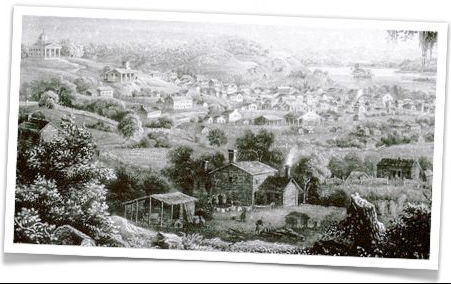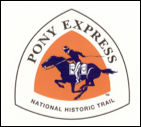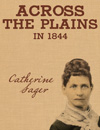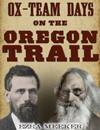St. Joseph

ABOVE: St. Joseph, Missouri in the 1840s
Joseph Robidoux, opened a trading post here in the early 1800s. "Uncle Joe," as Robidoux was called, platted the town in 1842 and named it for his patron saint. It became one of several important outfitting posts for the overland pioneers.
In 1850 Silas Newcomb wrote:
"This place contains some two thousand five hundred inhabitants and at present is a very busy place on account of the California emigrations which seems to center here; hills and dales are white with their camps. Many have crossed the river and encamped on the west side in the Indian Territory. Place contains four good sized Hotels, about twenty Stores and the residue is made up of groceries, bakeries, etc."
In St. Joseph on the evening of April 3, 1860, a rider, generally believed to have been Johnny Frey, mounted a pony in the Pike's Peak stable and started westward, thereby inaugurating the Pony Express. This first relay race to the West required 10 days.
 The St. Joseph Gazette of April 4, 1860, described the event:
The St. Joseph Gazette of April 4, 1860, described the event:
"Yesterday evening at 7:00 and fifteen minutes, the first carrier of the Pony Express left the office of the company in this city. . . . At the hour of starting, an immense crowed had gathered around the Express office to witness the inaugurating of the novel and important enterprise... But a dozen years ago the entire season was thought scarcely time enough to make the trip from Missouri to California, and companies of a less number than fifty, armed and organized, were deemed too weak to venture on the perilous route. Now a single man, aye, a defenseless woman, so far as Indians were concerned, need fear no evil."
There were about 180 riders; relay stations were usually about 9 to 15 miles apart. Letters had to be written on thin paper, and transcontinental delivery for the thinnest cost $5. In 1861 the service came to an end with the completion of the first transcontinental telegraph line.




